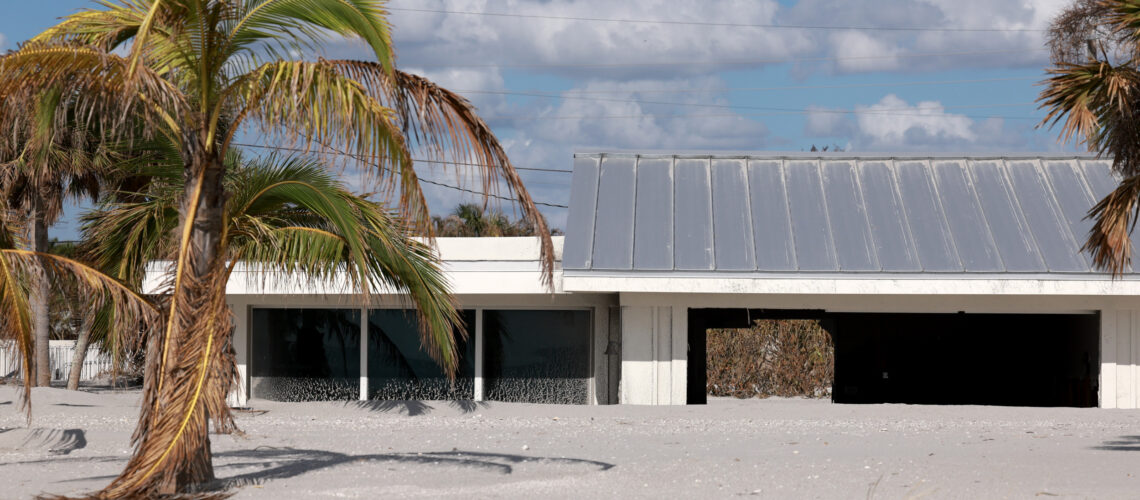How Florida Could Solve Its Insurance Crisis in 2025
January 7, 2025

- Health insurance reimbursement another benefit option available for small businesses
- Experts warn Los Angeles fires will impact insurance coverage in the future
- Emerging Greenhouse Risk and Insurance Trends for 2025
- Colorado ranks in the top 10 nationally with number of uninsured drivers
- Opinion | Americans Are Angry About Their Health Insurance—With Good Reason
The struggling Florida property insurance market was making progress towards stabilizing last year, according to some experts, when Helene and Milton struck the state late in the hurricane season, causing over $200 billion in damages.
Bạn đang xem: How Florida Could Solve Its Insurance Crisis in 2025
In the wake of the two devastating hurricanes, concerns over reinsurance hikes—how much insurance for insurers could grow—, looming insolvency for smaller companies, and increases in claim denials suddenly grew, making experts fear that Florida might still be a long way from solving its property insurance market crisis.
Newsweek asked several experts what lawmakers in the Sunshine State could do this year to find a permanent solution to the problems afflicting the Florida insurance market.
Why It Matters
Homeowners insurance premiums have skyrocketed in Florida in recent years due to a combination of excessive and unnecessary litigation, widespread fraud, and the increased risk of more severe and more frequent natural disasters posed by climate change.
While lawmakers have tried to tackle some of the issues that have led to the current crisis in recent years, including by forbidding third parties from claiming money from insurers on behalf of policyholders, the Sunshine State’s property insurance market has yet to stabilize.
The solutions found in Florida could serve as an example for the rest of the country, especially in disaster-prone states like California and Louisiana. These states’ homeowners insurance markets are also struggling with rising prices and private companies cutting coverage in the riskiest areas to avoid paying claims larger than their overall profits.
What To Know
“Florida is experiencing an amplified version of what several other states are starting to see as well,” Peter Molk, a professor at the University of Florida Levin College of Law, told Newsweek.
“It’s difficult to point to a single cause behind price movements in a market as complicated as this one. I’d suggest that lawmakers first spend a bit of time gathering and analyzing data and input from the state commissioner, insurers, and reinsurers to get an accurate sense of what the current real drivers are. It’s far better to legislate based on evidence than based on hope and instinct,” he said.
Lawmakers in Tallahassee have expressed their determination to address the current crisis, though the way they plan to go about it is not yet known. Experts in the field have some suggestions.
What’s The Current Situation In Florida?
For Dr. Martin Weiss, Founder of Weiss Ratings, the Sunshine State is still very much in the midst of a property insurance crisis.
Xem thêm : Can We Have Health Care Without Health Insurance Companies?
“We see a continuing trend of financial weakness and consumer disappointment, as evidenced by more property insurance company failures in Florida than all other U.S. jurisdictions combined,” he told Newsweek.
On top of that, Florida is exhibiting a rate of homeowner lawsuits against their insurers “that have consistently been at least ten times higher than the national average, triggered by record numbers of homeowner damage claims closed with no payment,” Weiss said.
New insurance companies are entering the state “with inadequate size, capital or experience—the same pattern associated with the large failure rates of recent years,” he added. “Virtually nothing is being done to address—let alone reverse—the massive homeowner rate hikes of recent years.”
But not everyone agrees with Weiss’ view of the current situation. Some, like Douglas McIntosh, Adjunct Professor of Law at NSU Florida, believe that important progress has already been made to get the Florida property insurance market out of troubled waters.
“The Florida insurance market was in a ‘hard market’ in 2020-2023. That means premiums increased, capacity for insurance decreased and legal costs were significant for insurers defending claims,” he told Newsweek.
“The market appears to have softened, partly due to insurance property litigation reforms enacted by the Florida Legislature, more insurers entering the market, and coverage becoming more available and competitive. Recent statistics suggest that 15 companies in Florida have sought rate reduction approval from the Office of Insurance Regulation, and 29 companies have made filings for a zero percent increase,” McIntosh said.
“These rates still need to be approved, and savings passed on to the consumer. The ‘wild card’ is how the Milton and Helene claims will impact the market, and Reinsurance rates—which have gone down due to tort reform and less suits being filed,” he added.
How The Crisis Can Be Solved: Independent Evaluations To Replace Ratings
“There’s a lot of work to be done,” Weiss said. “But the Florida CFO needs to take the first step—to seriously review the Exploratory Study of Alternative Rating Agencies [Horne Report],” he added.
Joe Raedle/Getty Images
“In it, he will see that, before any progress can be made on the many facets of the crisis, the legislature must make sure the FLOIR [Florida Office of Insurance Regulation] has a firm handle on the financial health of every Florida insurance company, based not on ratings that are bought and paid for by the rated companies, giving all companies an ‘A,’ but rather based on evaluations that are truly independent, free of conflicts, objective, and accurate.”
Continuing To Reduce Litigation In The State
While McIntosh doesn’t believe that the Florida property insurance market is still in a crisis, he still agrees that more work needs to be done to stabilize the sector. A key way to do it, he said, it’s to make sure that the recent tort reform is fully enacted.
In 2023, as part of its efforts to stop excessive litigation in the state, the Sunshine State enacted SB 2-A, a law that prohibited the state’s long-standing practice of assigning benefits to another party for those holding insurance policies issued after January 1 of the same year. The idea behind the bill was to stop third parties from making a profit off suing insurance companies in the process of claiming money on behalf of policyholders.
“Lawmakers enacted tort reform that must stand the test of time and challenges in courts, to make any lasting impact,” he told Newsweek. “Insurance carriers need to enhance their claims handling acumen and adjust valid claims before forcing insureds to pursue litigation, to save the extreme costs the legal process involves,” McIntosh said.
Freezing Property Taxes To Elevate And Harden Homes
State Senator Blaise Ingoglia, a Republican from Spring Hill, recently told Miami Herald he wants to offer tax incentives to homeowners who want to elevate or harden their homes—a move that would make them more resilient to natural disasters.
In exchange for this rather expensive operation, which can cost hundreds of dollars, Ingoglia wants to allow homestead properties in flood zones to have their property taxes frozen for 15 or 20 years.
“If you build it up, they’re going to have a precipitous drop in homeowners insurance premiums,” Ingoglia told the Florida newspaper. Newsweek contacted Ingoglia for comment by email on Monday.
Making Citizens Take On The State’s Hurricane Risk
Last year, State Representative Spencer Roach, a Republican from North Fort Myers, pitched his solution to the Florida property insurance market crisis: have homeowners pay hurricane premiums to the state’s insurer of last resort, Citizens, instead of for-profit, private insurers.
While the plan only got one hearing in 2024 and did not pass, the idea could be revived this year, though it’s risky. While it could make premiums cheaper for Floridians, it could also add an unbearable burden on the state-backed insurer should a major storm cause billions of dollars in damages.
A similar idea is being proposed this year by State Representative Hillary Cassel, a Democrat from Dania Beach, in the form of HB 13, which would require Citizens to offer windstorm coverage to every homeowner and condo association in the state.
What People Are Saying
Florida State Senator and Senate President Ben Albritton, a Republican representing Wauchula, told Newsweek: “Floridians have been faithfully paying insurance premiums for years, sometimes decades, and now they expect their insurance company to keep up its end of the bargain.
“I want to make sure that impacted Floridians and insurance companies hear me loudly and clearly—we are watching. We’ve made changes insurance companies said they needed to improve competition and stabilize rates. And, we’ve enacted pro-consumer transparency to protect homeowners. The proof will be in the results. I’m not going to sit idly by if legitimate claims get denied while rates continue to rise. Period.”
State Representative Chip LaMarca, a Republican from Broward County, wrote on X in October: “I don’t care what the solution is, but I want to find one for every Floridian. We must fix it.”
What’s Next
The Florida legislative session will begin on March 4 in Tallahassee. Proposed legislation will likely cover the problems of the state’s property market insurance.
Nguồn: https://propertytax.pics
Danh mục: News
